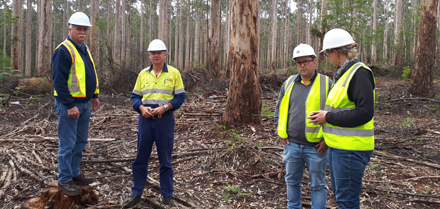
Western Australia has launched a plan that sets a new strategic direction for the state’s forestry industry based on local Aborigines’ spiritual outlook. The state’s Wood Encouragement Policy is a key part of what is called the Djarlma Plan, which was inspired by Djarlma – the Noongar concept that reflects the interconnected relationship of people, forests and woodlands. Source: Philip Hopkins for Timberbiz
The Minister for Forests, Dave Kelly, said the ecologically sustainable approach would transform the forestry industry and create new opportunities for economic growth and jobs.
“The Djarlma plan priorities healthy forests and woodlands while driving innovative practices in the industry,” he said. “The Wood Encouragement Policy highlights the benefits of building with wood, which is natural, renewable and stores carbon, making it one of the best tools we have for fighting climate change.”
Djarlma builds on the foundations of the Forest Management Plan 2014-2023. Its innovative approach ranges from ecological thinning in native forests to promote tree growth, to optimising the use of harvested wood fibre to produce environmentally sustainable products such as engineered timbers and bioplastics.
The initial plan is expected to last four years, to be followed by subsequent implementation plans.
A Wood Encouragement Policy has already been developed by the Forest Products Commission (FPC). This policy supports the forestry industry by encouraging the use of responsibly-sourced wood in the construction and fit-out of buildings in WA.
Mr Kelly said the Djarlma Plan was developed under the guidance of an independent panel, and with extensive industry and community consultation. Its priorities are health forests and woodlands to underpin forestry; providing forest and woodland values in a sustainable, low carbon future; community support for the values and benefit that forests and woodlands bring; and a technologically-led, competitive, collaborative industry.
Key feature of the Djarlma plan include:
- Expansion of the forest industry by supporting new plantations (softwood, hardwood and sandalwood) and farm forestry.
- Creating opportunities for Aboriginal-led engagement and practices within the forestry industry, including helping the development of Aboriginal forest enterprises.
- Encourage the state government to establish investment security guarantees to underpin new investment in the native forestry industry.
- Ecological thinning of smaller trees in imbalanced jarrah-marri regrowth forests, and operational trials to show improved forest health and resilience.
- In the jarrah-marri regrowth forests, focus forestry operations on growing-on sawlogs for the future.
- Support development of local markets for ecological thinning and harvesting residues, including bioenergy where wood fibre is unsuitable for higher value uses.
- Develop a regulatory framework for mechanical fuel reduction to reduce bushfire risk in an economically, socially acceptable way.
- Continue research into commercial trees species to improve productivity in a drying climate.
- Investigate the use of new and emerging technologies in aerial imaging and drones to improve harvest planning and review the success of regeneration.
- Establish a farm forestry section within the Forest Products Commission that supports the establishment of plantations and forestry on private land.
- Seek support for a forestry innovation hub in WA.
- Expand the regeneration of sandalwood and manage the extraction of wild sandalwood within the draft Biodiversity Management Program.
- Support research on the likely impacts of climate change on the resilience of WA forests, woodlands, plantations and farm forests to improve policy development.
Within six months, the FPC and the Forest Industries Federation of WA will put in place a process to deliver the Djarlma Plan, including specific, measurable, achievable and time-bound targets.
The WA forestry industry employs 6000 people and had an economic output in 2015-16 valued at $1405 million. WA has 2.25 million hectares of public native forest, of which 62% is set aside for conservation, while 38% is managed for multiple use forestry, including timber production.
There are 360,000 ha of plantations, of which 80,000ha are softwood (pine) plantations managed mainly for sawn timber, and 276,400 hardwood plantations, mostly managed for pulp logs.






